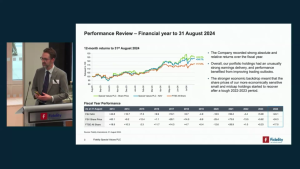Fidelity Special Values PLC (LON:FSV) aims to seek out underappreciated companies primarily listed in the UK and is an actively managed contrarian Investment Trust that thrives on volatility and uncertainty.
Supported by an extensive research team, they look to invest in out-of-favour companies, having spotted potential triggers for positive change they believe have been missed by others. As with vinyl, the true value of a company is almost always recognised in time, even if it temporarily falls out of fashion.
Investment objective
The investment objective of the Company is to achieve long term capital growth primarily through investment in equities (and their related securities) of UK companies which the Investment Manager believes to be undervalued or where the potential has not been recognised by the market.
Approach and style
Lead Portfolio Manager, Alex Wright, approach is very much in keeping with Fidelity Special Values’ heritage and history – that of contrarian investing, looking for unloved companies whose potential for recovery has been overlooked by the market.
Alex’s value-contrarian philosophy centres on buying unloved companies undergoing positive change and holding them until their potential value is recognised by the wider market. He looks to only invest in companies where he understands the potential downside risk to limit the possibility of losses. Ideally, he wants to invest in companies that have exceptionally cheap valuations or some kind of asset that should prevent their share prices falling below a certain level.
The aim is to position the Company as the investment of choice for those seeking exposure to UK listed companies but with the benefit of investing up to 20% of the portfolio in listed companies on overseas exchanges in order to enhance Shareholder returns.
Company Info
Website:
https://investment-trusts.fidelity.co.uk
Bloomberg FSV LN
Reuters FSV.L
Useful Documents
Portfolio Managers
- Alex Wright
- Jonathan Winton
![]() is a trademark of FIL Limited used with its permission.
is a trademark of FIL Limited used with its permission.









